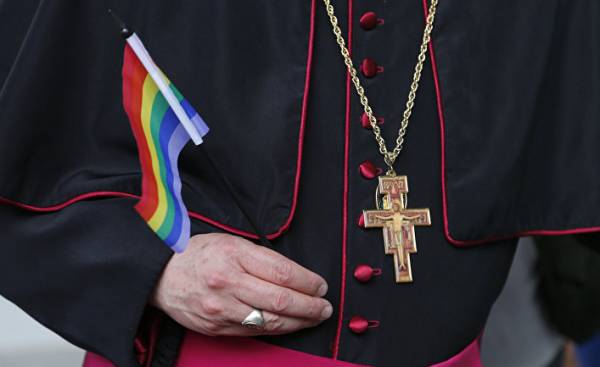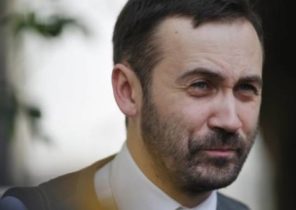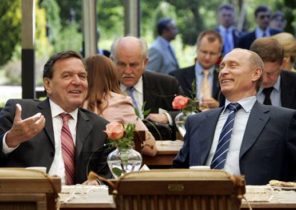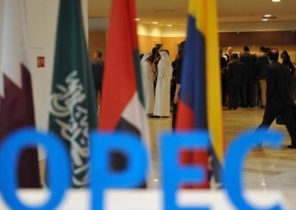
Greetings from Munich. This week I went to Trento in Northern Italy, where the conference was held on the role of tradition in modern life, America, Europe and Russia. I was there with a group of scientists from different countries. This conference was more like a round table than for some formal event. I’m still trying to sort out their thoughts about what I heard, but I want to share with you my preliminary findings.
To preserve the anonymity of participants, I’m not going to call them names and attributing specific statements to specific people. It’s not the fact that this conference was something scandalous. I just wish people could freely share their thoughts without worrying about that later someone will quote them. I also doubt that I ascribe to a particular point of view, members of a particular group, because it is likely that within this group there is disagreement. Please note that everything written below can and should be explained and corrected. I suggest you get to know these insights in order to continue the discussion.
So, let’s start.
From the beginning I noticed a curious detail: many of us felt that the rest have a few unrealistic expectations about condition and situation in our home countries. For example, the Russians were ready to oppose the point of view of American traditionalists (like me), according to which Russia is a defender of traditional Christian moral and religious values. Some of those present were believers, some not, but all of them were agree that it is a religious revival in Russia is not on such a large scale, how it is represented sympathetic to Russia Americans.
One Russian is recognized that what is now being revived in Russia, represents not a Christian, but rather the Soviet tradition, which is just a little cleansed in a spiritual sense. According to him, the result of the trauma of the totalitarian Communist regime, the tradition of Russian Orthodoxy has been destroyed. At the time, survived only those clergymen who collaborated with the Soviet authorities.
But other conference participants from Russia did not agree with this point of view. However, I found it useful to reflect on what values we consider “traditional”, in reality may not be so traditional. Undoubtedly, in some cases, we give certain sets of political or cultural-political positions by the authority of tradition. But this is misleading. “Tradition” can be a very useful concept that can be applied to promote one or another political program. Some Russians told me about how what is presented as a religious revival, is actually just a revival of nationalism, with the consent of religious leaders.
You can argue about what is meant by “tradition” in Russia and different European countries, but no one can deny that the traditions do exist. While I rode the train North through Italy, Austria and Bavaria, I was struck by the age met on the road and buildings construction. View on the medieval Church built on a hill. Anyone out there still praying? Maybe not anymore, but cultural memory is hard to ignore. In the process of its evolution in European countries the tradition has gained a lot of specific forms of artistic, architectural, social and so on.
In the United States different situation. What is the significance of the word “tradition” in the country and the society in which the tradition well? America is a product of the Enlightenment, a country that deliberately and emphatically rejects tradition. The dynamism of America is largely due to our well orientation, including our individualism.
This explains the difficulties encountered by some conference participants, who came from Russia and Europe, trying to understand how quickly and radically changing the situation in the United States. Despite the fact that we are all representatives of countries and societies undergoing constant change, Europe and Russia are more stable, tradition — and not necessarily religious. I could be wrong, but from my point of view, this explains to some extent why the movement Manif Pour Tous for the preservation of the forms and privileges of traditional marriages and families originated in France, but not in the US — despite the fact that the level of religiosity in the US is higher.
One of the participants of the conference who reads this blog, noted that it is hard to believe that the situation in the US is so disastrous. Several Americans have confirmed that the situation is indeed extremely difficult — especially in scientific circles. They spoke in detail about how discussions about sex and sexuality, which should be a normal part of the educational process, are now beyond what is permitted, and also about the price — professional and personal — you have to pay for violation of these new hard taboo. How can you defend tradition, contrary to these regulations, if violation is threatened with social and professional ostracism at best and career suicide at worst?
Moreover, this new, resolutely intolerant way of thinking very quickly captures the minds of the younger generation of Americans. According to one Professor, his students just don’t understand why any decent person may disagree with them in matters related to the LGBT community. It is not that they consider the moral and religious traditionalism incorrect. The fact that the former point of view became completely incomprehensible. Because of this, it seems they either immoral or malicious. In a private conversation, I told the story about the one Professor of theology, who dares to teach at his Catholic University position of the Catholic Church in matters of sexuality — he can’t even bring this issue up for discussion at the seminar. He’s afraid that his students will protest, complain to the University administration, and that it even could get fired over this.
Some participants of the conference came not from America, it was quite difficult to understand why the Professor cannot discuss such topics as marriage, family, and religious liberty closely related to rights of the LGBT community, unless it is completely supported.
One of the Russians expressed their dissatisfaction with the fact that the most contentious issues relating to religion and tradition continue to be associated with homosexuality. In his view, Christianity has no relationship to homosexuality, and those Christians who say that is just blowing this out of proportion. This view has not found wide support among members of the Russian delegation, although some of them admitted that a strong intolerance towards LGBT issues in Russia due to common prejudices rather than any kind of religious installations. They sincerely regret it and Express my absolute rejection of the violence and attacks faced by homosexuals in Russia.
On the other hand, in the USA the situation is developing in the opposite direction, and for the same reasons (unfounded prejudices and hatred of the other), we, the American traditionalists, it is easy to understand why the Russians so desperately resistant to the idea of expanding the rights of gays. In our example, the Russian saw that the growth of tolerance in relation to LGBT issues will inevitably open the door for radical intolerance as soon as LGBT activists and their supporters will prevail.
The conference also emerged the theme of Islam. Modern laws in Europe and in the United States, based not on religion but on a secular understanding of human rights. Undoubtedly, the roots of secular liberalism is to Christianity, but he takes a more neutral stance in relation to specific religions. As a European country will interact with Muslim believers living there? Perhaps Christian believers already are a minority in European countries, but nobody expects that they will begin to violate the civil order. It is obvious that with Muslims the situation is quite different. Yes, Yes, not all Muslims — and so on. But no sane people today will not argue with the fact that the continent was faced with an extremely serious problem. In addition, how can we respect the legitimate desire of Muslim Europeans to live in accordance with their traditions? Where you draw the line?
In the US this problem is not as acute as in Europe, because we are much better able to assimilate immigrants and because in our country there are so many Muslim communities. I tried to imagine that may think Europeans about Islam within their civilization. Because I am a American who is a sincere believer in religious freedom, my first impulse was the desire to play for the maximum of religious freedom. However, this ideal cannot obscure the fact that the Europeans are faced with extremely dangerous and difficult problem. How can a people whose religious traditions lose their significance, to live side by side with the minority, whose devotion to religious traditions is extremely strong?
At some point the participants began to discuss how difficult it is to establish and maintain the modus vivendi (i.e., coexist) in the framework of a pluralistic society. One of the speakers noted that if one side gets too much power, it becomes impossible. According to him, the U.S. has not yet reached that point. I disagreed with his opinion, since we Americans already are approaching that point, watching the struggle between LGBT rights and religious freedom. The secular elite — the elite of politics, business, media and entertainment industry — either already moved in a progressive direction, or, in the case of conservative politicians and a huge number of religious leaders prefer not to Express their point of view out loud for fear of being branded bigots. The balance is already broken. But many conservatives of the cultural and religious environment do not realize that very soon the balance will tilt towards LGBT people, given the fact that traditional attitudes that tend to stick to the older generation of Americans.
And what will happen next? One of the problems that I see in the position of Princeton Professor Robert George (Robert George) (view the video of the conversation between George and Senator Ben Sassari. about the “Benedict Option”), is that his position is “forward to the barricades culture war” is completely ineffective. I agree with him that we need to go all out to fight! But what good would that bring to us our freedom, if we lose our internal culture? The Benedict option involves not a choice “or-or”, but an approach of “both-and” much more significant emphasis on the development of a culture, not legal and political struggle.
Next. One Professor raised the issue of what he called “a mistake of the Hasidim”: the Hasidim believe that to maintain true Jewish tradition, you must dress as I dressed the inhabitants of the Jewish graying in the 18th century. In a sense he was right. On the other hand, here we are talking about the fact that the ideals must be manifested in some material things — in art, architecture, customs, habits and, Yes, even clothes. The most difficult thing here — to determine which material things play a key role in preserving traditions, and which are not. And this brings us back to the point of view expressed by the Russians at the beginning of the conference: what is the true tradition, is the subject for regular debate and discussion. One American law Professor noted that in the United States progressively trying to rewrite the definition of religious freedom, reducing it to a more restrictive definition of “religious freedom” and calling it a continuation of the American tradition, although it is not so.
Later, when we walked through the streets of Trento and talked, one of the American participants of the conference said that he was surprised by the extent of the problem Russians are different from ours and how they are at the same time similar. Both the Americans and the Russians are trying to understand the role of the State in the lives of religious believers: in the case of Russia the state tries to interfere in all Affairs, often through political co-optation, and in the case of America, the State seeks to limit religious freedom. It seems to me that the weakness of religious traditions in both of our countries and religious traditions, which should serve as a counterweight to the trends of modernity — and became one of the main causes of the global crisis.
The Russians, who mentioned my book “the Benedict Option” (The Benedict Option), have expressed some criticism in its address (I have to admit, it is constructive), but they all agreed that it is necessary to translate into Russian and publish in Russia because its basic ideas can help Russia in her own struggle. It surprised and pleased me, as European interest in my book. I finished writing this article in the train that was taking me from Trento to Munich, where Matt and I meet fans of my book. I look forward to the moment when will be able to listen to them and understand how we aim to preserve the traditions of Christians can work together. In this sense, last week was very successful.







